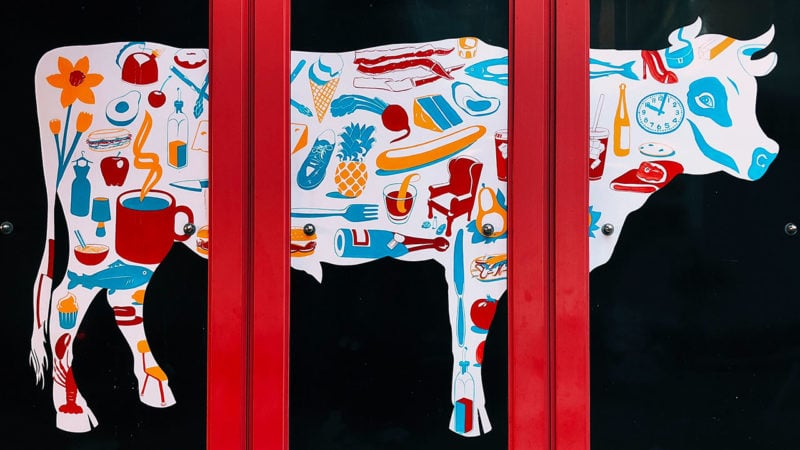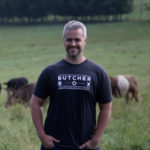Last Updated on January 16, 2024
A little more than two years ago, we started ButcherBox in the offices of a friend’s Cambridge creative agency. We have grown exponentially since then—we now have more than 25 employees in Harvard Square and elsewhere across the country. Proudly, we still haven’t had to take any money from venture capitalists or other institutional investors.
From the beginning, ButcherBox has been a project of passion. I will get into that more a bit below, but basically, two forces—family and health—led the groundwork for what has become the company that our amazingly loyal customers have grown to know and love.
Initially, it was a health problem my wife developed that drove me to learn more about the potential benefits of more humanely-raised meats—grass-fed beef, heritage-breed pork, free-range chicken. A few years back, she developed a thyroid issue. One of the suggestions to improve her health was to look into adding cleaner foods to our diets. Over and over again, we kept discovering grass-fed beef popping up on lists of foods it was suggested we add to our diets. We did more research on the topic and soon started eating grass-fed beef.
The other major influence that led to ButcherBox’s founding was the birth of my children. Knowing we wanted them to eat healthier from the start, I set out to find ways get quality, humanely-raised meat in a way that was affordable for a family. This led to my first involvement in a cow share and eventually to the realization that a lot of people wanted grass-fed beef and similar meats but didn’t have access to them.
These experiences are why ButcherBox exists today.
To be clear, the reasons my co-founder, Mike Filbey, and I founded ButcherBox haven’t changed. This fundamental part of our story remains solid. It is, after all, our foundation.
However, as we have grown, I have been thinking more deeply about the story that is ButcherBox, and, strangely, I have discovered that it was quite inevitable—more than I had realized—that I’d spearhead an endeavor promoting healthy, humanely-raised meat.
First, and I don’t know how better to explain this, but I have been surrounded by cattle—smiling, grazing in fields, peaceful—my entire life.
On a recent visit to my mother’s house, something struck me that I had never thought about before. You see, my mother’s home is—and has been for as far back as I can remember—decorated, floor to ceiling, with cows. There are cows on kitchen decorations, pictures of cows, and more.
I believe our home has been this way since my mother immigrated— with my three siblings and me—from Uruguay to the United States when I was a mere six-months-old. Uruguay is one of the grass-fed beef capitals of the world, and, quite possibly, this is the inspiration for my mother’s decorative leanings. My father still lives in Uruguay, and that country has always called to me.
In some way, this has subconsciously impacted a lot of my choices. Believe it or not, I have a large painting of a cow displayed in my bedroom. It has been there since well before ButcherBox was a thing.
While the overall influence of cow-laden, aesthetical decisions of my family may not be as personal as the two reasons mentioned above, I can’t deny that being surrounded by calming cattle art didn’t somehow serve as a bias towards being an advocate for more humane cattle industry practices.
This idea that there is a better way, for consumers and cattle, is also something that I have been thinking about for a lot longer than I realized.
Trying to find healthier meats for my wife and children was, without a doubt, the main catalyst for the birth of ButcherBox. But it has also been part of my business ethos, whether I realized it or not, that there is something fundamentally incorrect with how specific industries treat their products, and then how this impacts consumers’ relationship with those products and industries. This too is part of the founding story of ButcherBox.
Recently, I was looking over a slide deck from when I pitched my former company, CustomMade, to investors. One of the slides quickly caught my eye. I had completely forgotten about the slide, but it featured two cows. One was a cow on a feedlot; the other was a cow grazing in an open field.
We had used this slide as a way to explain what we thought about the marketplace for creatives and craftspeople. For CustomMade, we wanted to highlight how consumers in the digital age wanted to know the story behind what they were purchasing. This shift was occurring in the food industry well before ButcherBox’s founding, and we highlighted the parallels to the craft industry for CustomMade.
As we saw it, more consumers better understood that the state of feedlots was a miserable existence for the products they were purchasing, when it comes down to it, for the pleasurable experience of eating a steak. The happier cattle on the range were more in line with the overall story that makes consumers feel better about the meat they are buying.
Rediscovering the slide again made me realize how the concept of product storytelling—specifically, giving customers the products that align with their beliefs—has been a priority in my business life for a long time. It took the old pitch deck to help me make the connection.
Why do I tell these stories?
Businesses—the ones that people can get passionate about—aren’t borne out of thin air. The stories of how they came into existence tell a lot about the people that built them and where they are going.
For ButcherBox, one of the cornerstones of our mission is family. This permeates all we do, from how we hire to how we treat our customers.
But we are also striving to make others happy, bringing joy in some way while being on a mission to improve the world. I was reminded of this by returning to my mother’s cow-filled home.
As we grow, more and more people will contribute to the company and they too will add their own positive influences to the ButcherBox story. That’s the only way to build something that can truly resonate.
Mike Salguero is the CEO and founder of ButcherBox.



